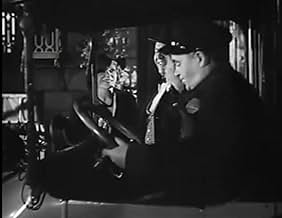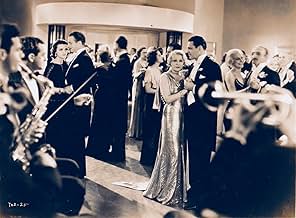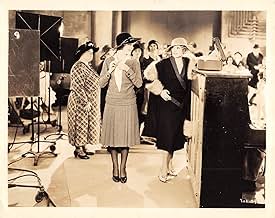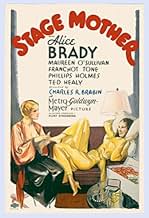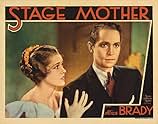Adicionar um enredo no seu idiomaA vaudeville star has to leave her daughter with her dead husband's stuffy Boston parents while she makes a living. But when the daughter shows some talent, the mother become a stage mother ... Ler tudoA vaudeville star has to leave her daughter with her dead husband's stuffy Boston parents while she makes a living. But when the daughter shows some talent, the mother become a stage mother and pushes her daughter into becoming a Broadway star. The mother is a monster with a hear... Ler tudoA vaudeville star has to leave her daughter with her dead husband's stuffy Boston parents while she makes a living. But when the daughter shows some talent, the mother become a stage mother and pushes her daughter into becoming a Broadway star. The mother is a monster with a heart of gold, and after breaking up the daughter's love affair, finally sees the error of her... Ler tudo
- Direção
- Roteiristas
- Artistas
- Prêmios
- 1 vitória no total
- Dexter's Butler
- (não creditado)
- Hors D'Oeuvres Waiter
- (não creditado)
- Mr. Mark Thorne
- (não creditado)
- Mustached Man With Badge
- (não creditado)
- Nurse
- (não creditado)
- Miss Gilford - Kitty's Music Store Boss
- (não creditado)
- Music Store Customer
- (não creditado)
- Mr. Sterling - Dance Instructor
- (não creditado)
- Audience Member
- (não creditado)
- …
Avaliações em destaque
The crazy life of a theater performer in the 1930s, is the main drive of the plot. The kid grows up to be Maureen O'Sullivan. Yes, that Maureen O'Sullivan. The one, who would go on to play Jane, in six of the Johnny Weissmuller, Tarzan films. After staying with her grand parents for a number of years, Shirley is reunited with her mother, Kitty. She is 16 years old and this is the point O'Sullivan steps in for her character. In fact, I was impressed with the way the filmmakers made-up 22 year old O'Sullivan, to age from 16 to her 30s. So, stage Mother wants her daughter to be a dancer. An idea, Shirley isn't to keen about, but accepts the direction her life is about to go in, thus setting up a possible Mommy Dearest scenario. Fortunately, Shirley will age to a point, that the Mommy Dearest phase doesn't fester.
When Shirley goes for her first try-out, the collection of kids routines were pretty funny. I did notice some bad edits in Stage Mother (1933), even by 1933 standards, but the camera work was really nice. 55 minutes into the film, Shirley breaks up sadly, with her man she is seeing and minutes later, does a great show, with some amazing sets, created for the dance numbers. Some may question moments of the acting in the movie, but I liked C. Henry Gordon as Ricco. The film ends kind of quickly and abruptly, plus there's a uneasy feeling, that things didn't go the way you thought they would. The happy music, playing out to the film's end, doesn't hide the real anguish behind Shirley's eyes. Did Mommy Dearest actually win? Stage Mother (1933), is still a cinematic artifact, from an earlier time. I thought it was cool. It's not a great film, but still, fairly good.
6.3 (D+ MyGrade) = 6 IMDB.
We tend to hear about the sports parents, or the stage parents because their children become famous and let the world know about their upbringing. We don't hear about those sports parents or stage parents whose children never made it big. We also don't hear about the doctor parents, lawyer parents, or other career parents who drive their children just as hard.
Shirley didn't have a normal childhood, and what's worse is that when she became a young adult, she was just as attached to her mother as when she was a child. It's like once the parents get their hooks into their children they never let them go.
I thought "Stage Mother" was spot on. The movie focused on lost love due to mothering which was following with the sentiments of that era. If a (s)mother(er) was going to make her daughter miss out on anything back then it would be love, not another career or simply being happy. Shirley's happiness had to be directly attributable to the man she fell in love with and it would've been sacreligious to think her happiness came from some other source.
Free on Odnoklassniki.
Co-screenwriter Bradford Ropes, who also wrote the novel on which "42nd Street" is based, knew this tawdry milieu intimately and wasn't afraid to expose its seamy sides; fortunately, the movie came just before the Production Code, so its portrayal of the shabbiness and moral compromises of the show biz doesn't pull its punches. It resembles "Gypsy" and the great early talkie "Applause," and in particular, its look at backstage and onstage vaudeville is historically fascinating. Its main shortcoming is a too-fast, too-tidy final reel that races unconvincingly toward a happy ending. Also, Maureen O'Sullivan, pretty and spirited as always, doesn't really convince as a young miss aiming to become the toast of Broadway. (She's dubbed, and that's clearly a double dancing in the long shots.) Till that rushed denouement, though, it's a brash and winning backstager, and Brady's uncompromising, unsympathetic performance stays with one for days.
Você sabia?
- CuriosidadesLarry Fine's only solo screen appearance without his partners in The Three Stooges.
- Erros de gravaçãoTap dancing is heard during the child contortionist's audition.
- Citações
Kitty Lorraine: I'm going to Boston to Fred's people. They sent me a telegram.
Blonde: What, live in Boston? I'd hate to take a kid as young as that one to that town. It's liable to make her peculiar for life!
- ConexõesReferenced in Amantes Fugitivos (1934)
- Trilhas sonorasAny Little Girl, That's a Nice Little Girl, Is the Right Little Girl for Me
Music by Fred Fisher
Lyrics by Thomas J. Gray
Sung by Alice Brady at the music store
Principais escolhas
Detalhes
- Data de lançamento
- País de origem
- Idioma
- Também conhecido como
- Stage Mother
- Locações de filme
- Empresa de produção
- Consulte mais créditos da empresa na IMDbPro
- Tempo de duração
- 1 h 25 min(85 min)
- Cor
- Proporção
- 1.37 : 1

